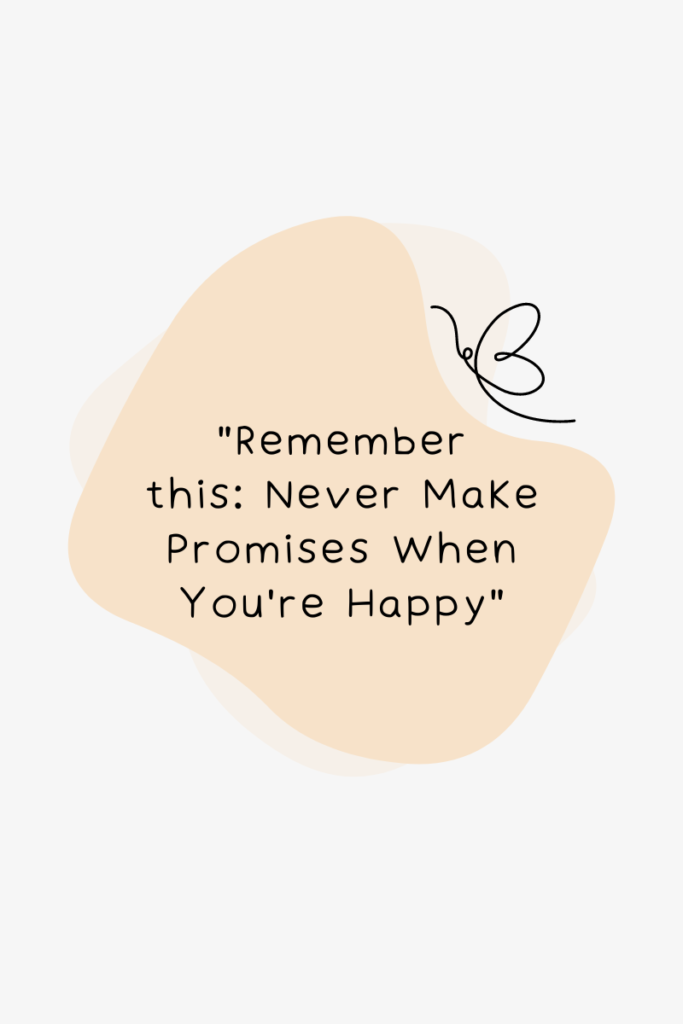
Ah, promises. Those sweet little whispers that make us feel all warm and fuzzy inside, only to turn around and bite us in the rear when we least expect it. Let’s face it; we’ve all made promises we couldn’t keep—some of us more than others (you know who you are). But today, we’re going to dive into the treacherous world of promises and figure out why it’s a good idea to avoid them like the plague.
In this glorious tell-all, we’ll explore the importance of not making promises and why your life will be so much easier without them. So sit back, relax, and get ready to have your mind blown—or at least gently nudged in a new direction.
Buckle up, folks, because we’re about to embark on a wild ride through the twisted landscape of broken dreams and unfulfilled commitments.
The Dangers of Making Promises
Before we move forward, let’s talk about why you, my dear reader, would even want to make promises in the first place. Are you trying to impress someone with your incredible commitment skills? Or perhaps you think that by making promises, you’ll magically transform into a superhero capable of accomplishing the impossible?
Whatever your reasons, one thing is clear: promises are a seductive trap, luring you in with the sweet nectar of good intentions only to leave you hanging in a tangled web of disappointment.
The Potential Negative Consequences of Making Promises
Here’s the thing: making promises is like playing with fire. Sure, it might keep you warm for a while, but if you’re not careful, you’ll end up with a blazing inferno that consumes everything in its path. You see, when you make a promise, you’re not just setting yourself up for failure—you’re also setting up everyone around you for a nice, big letdown. Sounds fun, right?
The dangers of making promises include, but are not limited to:
- Damaging trust: When you break a promise, you’re basically telling the other person, “Hey, guess what? I don’t value our relationship enough to keep my word.” Ouch. Way to win friends and influence people, champ.
- Hurting your reputation: If you develop a habit of breaking promises, people will start to see you as unreliable and untrustworthy. And as we all know, a bad reputation is harder to shake than a persistent telemarketer.
- Creating stress and anxiety: Every time you make a promise, you’re adding another item to your already overflowing to-do list. And let’s be honest, that list is about as likely to shrink as your laundry pile on a lazy Sunday.
- Straining relationships: Breaking promises can lead to arguments, resentment, and even the end of friendships or romantic relationships. It’s like tossing a grenade into the fragile ecosystem of human connections—what could possibly go wrong?
- Undermining your self-confidence: Every time you break a promise, you’re reinforcing the idea that you can’t follow through on your commitments. It’s like giving yourself a big, fat “F” on the report card of life. Who needs self-esteem anyway, right?
- Missing out on opportunities: When you’re constantly trying to fulfill promises you shouldn’t have made, you might miss out on other opportunities that come your way. You’ll be too busy putting out the fires you started instead of chasing your dreams and achieving your goals.
- The snowball effect: You might think that breaking just one little promise won’t have much of an impact, but it’s like a snowball rolling downhill—it only gets bigger and more destructive as it goes. Before you know it, you’re juggling a whole slew of broken promises, wondering how you got yourself into this mess.
- Transforming into a chronic people-pleaser: Making promises to keep others happy can turn you into a people-pleaser who constantly sacrifices your own well-being to fulfill others’ expectations. Spoiler alert: this is not a recipe for a happy, fulfilling life.
- Distorting reality: When you make promises you can’t keep, you’re creating a false sense of hope and expectation. It’s like living in a fantasy world where everyone’s wishes come true—except that, in reality, they don’t. And when reality comes crashing down, it’s not pretty.
- Stifling personal growth: By making promises, you might be avoiding the opportunity to learn from your mistakes and grow as a person. Every time you make a promise you can’t keep, you’re shielding yourself from the valuable lessons that come with failure and setbacks.
Now that we’ve painted a lovely picture of the dangers of making promises let’s delve into some timeless wisdom that further emphasizes our point. Trust me; it’s not all doom and gloom from here on out—there’s some humor and enlightenment waiting for you in the next sections!
Saying: “Never Make Promises When You’re Happy”

You know how it goes: you’re on cloud nine, life is a bowl of cherries, and you suddenly feel like you can conquer the world. In the heat of the moment, you make grandiose promises that seem totally doable—until reality smacks you in the face with a wet fish. Yep, making promises while riding the euphoria wave is a one-way ticket to Regretsville, population: you.
Let’s take an example:
Imagine you’re at a party, having a blast, and you promise your friend you’ll help them move next weekend. But when the day comes, you’re nursing a wicked hangover and seriously regretting your overenthusiastic commitment. Or maybe you’re feeling the love on your anniversary, and you promise your partner a romantic getaway to Paris—only to discover that your bank account says, “Non, merci.”
The point is, making promises when you’re happy is like trying to write a Shakespearean sonnet while riding a roller coaster: it’s just not going to end well.
Tips to Avoid Making Promises When in a Positive Emotional State
- Take a deep breath (or ten!): Before committing to anything, give yourself a moment to cool down and think it through. Don’t let the happy hormones hijack your decision-making skills.
- Sleep on it: If you’re still feeling giddy about your promise the next day, maybe it’s not such a bad idea after all. But chances are, a good night’s sleep will help you see things more clearly.
- Channel your inner lawyer: Ask yourself, “What would a lawyer say?” If they’d tell you to read the fine print and consider all the possible outcomes, maybe you should too.
Saying: “Don’t Make Promises You Can’t Keep.” (or, “Don’t Make Promises You Don’t Intend to Keep.”)

Now, let’s discuss another pearl of wisdom: “Don’t make promises you can’t keep,” or its equally wise cousin, “Don’t make promises you don’t intend to keep.” This one seems like a no-brainer, right? But you’d be surprised how often people make promises with all the enthusiasm of a kid in a candy store, only to realize later that they’ve bitten off more than they can chew.
This saying is a friendly reminder that if you’re not 100% sure you can deliver on your promise, it’s best to zip those lips and avoid disappointment.
Picture this: you promise your coworker you’ll cover their shift next week, only to realize that you’re double-booked and now have to disappoint not one but two people. Or maybe you promise your child a trip to Disneyland, knowing full well that it’s financially out of reach. When you inevitably break these promises, you’re not only letting others down but also setting yourself up for a heaping helping of guilt and frustration.
Tips to Ensure Promises Made Are Realistic and Achievable
- Be honest with yourself: Assess your capabilities, resources, and time before making a promise. It’s better to be upfront about your limitations than to disappoint someone later on.
- Break it down: If a promise seems overwhelming, break it into smaller, manageable tasks. This way, you can determine if it’s feasible or if you’re setting yourself up for failure.
- Consult your calendar: Before making a promise, take a good, hard look at your schedule. Will you really have the time and energy to commit to this promise, or are you just setting yourself up for a spectacular crash and burn?
- Learn to say “no”: It’s not a dirty word, we promise. Sometimes, saying “no” to a request is the kindest and most honest thing you can do—for both yourself and the other person.
- Seek a second opinion: If you’re unsure about whether you can keep a promise, ask someone you trust for their perspective. They might see potential obstacles that you’re overlooking.
So there you have it, folks. A crash course in the dangers of making promises and some sage advice to help you navigate the treacherous waters of unfulfilled commitments. Now, go forth and break the cycle of broken promises! Your future self (and everyone around you) will thank you.
Alternatives to Making Promises
A) Setting Realistic Expectations
Instead of making grand, sweeping promises that are about as stable as a house of cards, try setting realistic expectations. You know, like telling your friend you’ll “do your best” to help them move, rather than swearing on your favorite pair of socks that you’ll be there. It’s like trading in your high-stakes poker game for a friendly round of Go Fish—way less pressure and a much better chance of success.
B) Communicating Effectively
Good communication is the key to any successful relationship, whether it’s with your partner, friends, or coworkers. Instead of making promises you’re not sure you can keep, be upfront about your limitations and concerns. Trust us; they’ll appreciate your honesty way more than your empty words.
C) Focusing on Actions Rather Than Words
You know the saying, “Actions speak louder than words”? Well, it’s true. Instead of relying on promises to convince others of your commitment, show them through your actions. After all, it’s way more impressive to surprise your partner with a romantic weekend getaway than to promise them the moon and the stars—only to deliver a burnt grilled cheese sandwich.
Conclusion
So there you have it, dear reader: a comprehensive guide to why making promises is about as useful as a screen door on a submarine. We’ve covered the dangers of making promises, explored some famous sayings that echo our sentiments, and offered up an array of alternatives that’ll help you avoid the promise trap altogether.
Now it’s time to put this newfound wisdom into action. Go forth and conquer the world, free from the shackles of broken promises and unfulfilled commitments. Embrace the power of honest communication, realistic expectations, and meaningful actions. And remember, the next time someone asks you to make a promise, channel your inner Shakespeare and say, “To promise or not to promise? That is the question.” Spoiler alert: the answer is “not to promise.”



